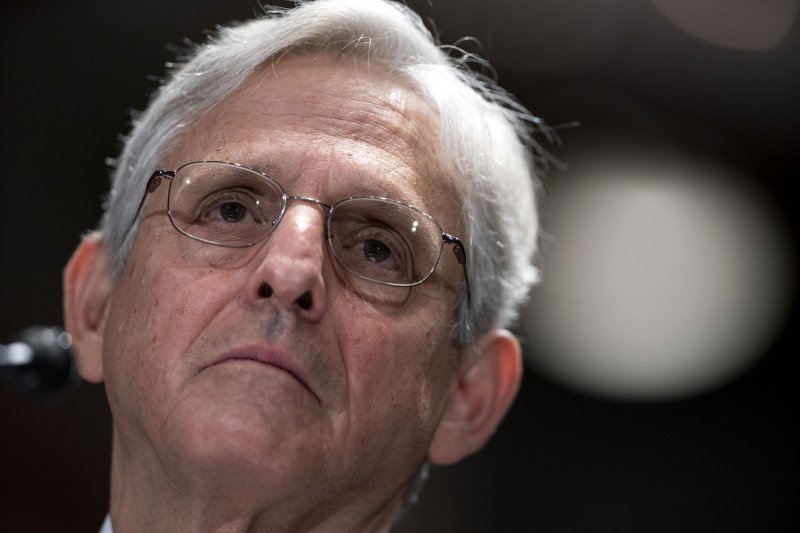The Justice Department under Attorney General Merrick Garland on Wednesday charged nearly a dozen people with attempting to illegally export controlled technology to Russia. Photo by Michael Reynolds/UPI |
License Photo
Oct. 20 (UPI) -- The United States has charged nearly a dozen people and several companies on accusations of participating in massive schemes to export dual-use technologies to Russia, some of which have been used in the Kremlin's war in Ukraine.
The Justice Department announced the two cases Wednesday.
One of the cases involves five Russians and two Venezuelan oil traders who are charged with participating in global sanctions evasion and money laundering. The other case indicts three Latvians and one Estonian as well as two European companies with violating U.S. export laws for the benefit of Russia.
"These charges reveal two separate global schemes to violate U.S. export and sanctions laws, including by shipping sensitive military technologies from U.S. manufacturers -- including types found in seized Russian weapons platforms in Ukraine -- and attempting to re-export a machine system with potential application in nuclear proliferation and defense programs to Russia," Attorney General Merrick Garland said in a statement.
A 12-count indictment unsealed in Brooklyn, N.Y., on Wednesday identifies Russians Yury Orekhov, 42; Artem Uss, 40; Svetlana Kuzurgasheva, 32; Timofey Telegin 39; and Sergey Tulyakov, 52, as defendants along with Spanish national Juan Fernando Serrano Ponce, 47; and Juan Carlos Soto, whose nationality and age were not mentioned in the charging document.
Prosecutors accuse Orekhov and Uss of having run a fraud, illegal export and money laundering operation since at least 2018 through an industrial equipment and commodity trading company for which Orekhov served as chief executive officer and Uss is its owner.
Using the company as a front, the pair with help from their co-conspirators purchased sensitive microprocessors used in fighter aircraft, missile systems, smart munitions, radar and satellites, among other military uses, which were then shipped to Russian companies, including sanctioned firms that service Moscow's defense sector.
The charging document also said they used the company to smuggle hundreds of millions of barrels of oil from Venezuela to Russia and China, including to sanctioned entities.
Ponce and Soto are accused of brokering the million-dollar deals between Orekhov and Uss' company and Venezuelan state-run oil company PDVSA with payment often routed through U.S. financial institutions.
On Monday, Orekhov was arrested in Germany and Uss in Italy at the request of the United States, which said it will begin the extradition process.
If convicted the defendants each face a maximum sentence of 30 years' imprisonment.
In a corresponding move, the State Department and Treasury designated Orekhov and his companies Nord-Deutsch Industrieanlagenbau GmbH and Opus Energy Trading.
"Orekhov and his companies have directly contributed to the Kremlin's unjustified war of aggression against Ukraine," Secretary of State Antony Blinken said in a statement.
The second indictment was unsealed Tuesday in the District of Connecticut, accusing Latvians Eriks Mamonovs, 33, and Vadims Ananics, 46, of conspiring with Ukrainian Stanislav Romanyuk, 37; Latvian Janis Uzbalis, 46; and others to violate U.S. export laws and regulations in the process of smuggling a jig grinder to Russia.
A jig grinder is a high-precision machine system that can be used in nuclear proliferation and defense programs.
Due to its potential use, export of the Connecticut-manufactured technology to Russia requires a license though one is not needed for European sales, prosecutors said.
The indictment charges them with conspiracy, violation of the Export Control Reform Act, smuggling goods from the United States and international money laundering while Mamonovs is also charged with making false statements to the U.S. Department of Commerce. The charges come with maximum prison sentences of between five and 20 years.
Authorities said Ananics, Mamonovs and Uzbalis were arrested in Riga, Latvia, on Tuesday while Romanyuk was arrested in Estonia on June 13. The United States is also seeking their extradition, prosecutors said.
Their arrests follow a three-year investigation, according to the Justice Department.
"These arrests and the seizure of the jig grinder are the result of the tenacious investigative work of our special agents and partners and show what can be achieved through these partnerships," Matthew Millhollin, special agent in charge of of Homeland Security Investigations in New England, said in a statement.















